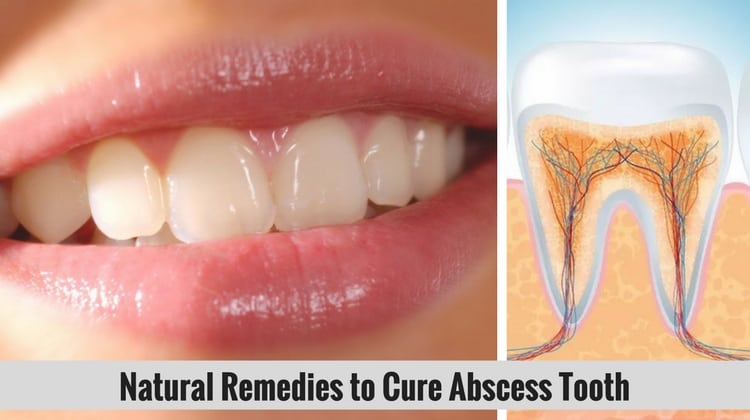
Are you getting a sharp or sudden pain while taking cold or hot foods from nerve endings of the teeth? Then you’re suffering from tooth sensitivity.
You can’t even enjoy an ice cream or cold beverages, hot tea, soups or even cold water due to this teeth sensitivity. Intake of cold, hot, sweet or sour foods will cause a sharp pain from the nerve ending of the teeth.
The main reason is that the protective enamel around the teeth gets erode and thereby exposes to the nerve endings under the teeth. Plaque, cavities, intake of acidic foods, infections, brushing with hard bristled toothbrush, tooth decay, worn filling, aging, exposed roots, fractured tooth, etc. are some causes for this tooth enamel.
Fortunately, there are many natural remedies that help you to treat this tooth sensitivity at home. But make sure to consult your doctor if you’re suffering from a severe or chronic form of tooth sensitivity.
Home Remedies for Tooth Sensitivity:
Treat your tooth sensitivity with the below mentioned natural home remedies. Have a look at these remedies and follow it regularly to reduce your tooth sensitivity.
Let’s get started…
Remedy – 1: (Coconut Oil Pulling)
Oil pulling is an effective way to maintain your oral health and prevent the tooth problems like bad breath, gum diseases, toothaches, etc.
Coconut oil has natural antibacterial, antiseptic and anti-inflammatory properties that reduce the effect of streptococcus mutans bacteria and plaque in the mouth and teeth and thereby reduces the sensitivity of your teeth.
- Place 1 tablespoon of virgin coconut oil in your mouth and swish it all around the mouth for 15 – 20 minutes.
- Then spit out the oil and wash your mouth thoroughly with warm water.
- After that, brush your teeth gently as usual with your toothpaste.
- Repeat the same process once daily in the morning before brushing your teeth (or) before eating.
Note:
- You can also replace the coconut oil with sesame oil for this oil pulling.
- Make sure that not to swallow or gargle this oil why because it contains all the harmful bacteria (pulled from your mouth).
Remedy – 2: (Salt Water)
Saltwater plays a major role in treating your oral problems. It improves the pH balance of your mouth by creating an alkaline environment (an unfriendly environment for harmful bacteria to survive) and also layers a protective sheet over your teeth to get rid of sensitivity.
Regular usage will help to reduce the dental pain and treat gum sores which may cause tooth sensitivity.
- Add 1/2 teaspoon of salt in 1 cup of lukewarm water and stir well.
- Use this salt water to rinse your mouth (or simply gargle with this salt water).
- Spit out the solution and wash the mouth thoroughly with water.
- Continue doing the same process for twice daily (once in morning and once at night before bedtime) till you get complete relief from the sensitivity of your teeth.
Note: Or mix 1 teaspoon of rock salt in 1 tablespoon of mustard oil. Stir well and apply this oil mix on the affected tooth using your clean finger. Massage gently and rinse off with water after 5 – 8 minutes.
Remedy – 3: (Cloves)
Cloves exhibit anesthetic, antibacterial and anti-inflammatory properties that help a lot in treating the oral infections and also reduce the pain and sensitivity.
Here are some ways of using clove for treating your sensitive tooth. Follow any of these clove methods for twice daily.
- Take 2 whole cloves and grind it. Mix it with a little olive oil to make a paste and apply it on the affected tooth. Wait for at least 30 minutes and rinse your mouth thoroughly with water.
- Take clove oil and dab it directly on the affected tooth and gum using a cotton ball. Let it sit for 20 – 30 minutes and rinse off with water.
- Simply mix 5 – 6 drops of clove oil in 1/2 glass of lukewarm water. Stir well and use this solution to rinse your mouth.
- Boil cinnamon stick and cloves in a pot filled with 1 cup of water for few minutes. Strain and use this solution to gargle your mouth. Regular follow – up will help to prevent the teeth erosion.
Remedy – 4: (Garlic)
The allicin compound in garlic acts as a powerful antibacterial and anesthetic agent that helps you in dealing with tooth sensitivity. It effectively kills germs causing infection and reduces the pain caused by tooth sensitivity and abscess infection.
- Crush 1 – 2 garlic cloves and add 2 – 3 drops of water and some salt to it.
- Stir well and apply it directly on the affected tooth.
- Wait for few minutes and rinse your mouth with warm salt water.
- Continue doing the same process for twice daily till you cleared the tooth sensitivity.
Note:
- Or mix some salt in crushed garlic and apply it on the affected tooth. Rinse off with water after 10 minutes. Do it once daily to treat sensitive teeth.
- Or simply cut a garlic clove and use the cut side of garlic to rub it gently on the affected tooth for 7 – 10 minutes. After that, wash off with lukewarm water and repeat it or 2 – 3 times daily.
Remedy – 5: (Oregano Oil)
Oregano oil exhibits antibacterial, antioxidant and anti-inflammatory properties that help you to deal with the tooth sensitivity and the pain caused by it.
- Apply 2 – 3 drops of oregano oil directly on the affected tooth with your clean fingers.
- Massage it gently for few minutes and let it sit for about 10 – 15 minutes.
- Rinse the mouth with lukewarm water and continue this process for twice daily.
Note: Or simply mix 4 – 6 drops of oregano oil in 1/4 cup of lukewarm water. Stir well and use it as your mouthwash for 2 – 3 times daily for few days till you get rid of tooth sensitivity.
Other Effective Remedies:
- Guava leaves have quercetin flavonoids, analgesic properties along with free radical scavenging activity that helps to relieve your toothache and tooth sensitivity. Place 4 – 5 guava leaves in 1 cup of water and boil for 5 minutes. Cool down and add some salt. Use it as your mouthwash (or) simply chew 1 – 2 fresh, tender guava leaves in few minutes and spit it out. Do it 2 – 3 times daily.
- The quercetin flavonoids in onion exhibit antimicrobial and anti-inflammatory property that helps you to get rid of bacteria causing oral infection or pain caused by tooth sensitivity. Cut a piece of onion to the size of your tooth and place it on the affected tooth. Rinse with salt water after 5 – 10 minutes (or) simply chew some onion slices. Repeat it 2 – 3 times daily.
- Hydrogen peroxide (food grade 3%) is an amazing ingredient used for oral health care. It has an antibacterial property that clears germs causing toothaches and other oral problems, including tooth sensitivity. Mix equal parts of hydrogen peroxide and water to prepare mouthwash and use it 2 – 3 times a week.
Tips and Suggestions:
- Avoid the consumption of any food and drinks that are rich in sugar and acid content, which dissolve the tooth enamel and thus lead to dentin exposure. So, avoid carbonated drinks, wine or citrus fruits and also drink plenty of water to balance the acid levels in the mouth after eating the acidic foods.
- Remember that not to brush your teeth right after you eat or drink any acidic substances why because it damages the tooth enamel. So, wait for 30 minutes before brushing the teeth.
- Brush your teeth with a soft-bristled toothbrush for twice daily along with floss. Also, use desensitizing toothpaste and avoid the usage of tartar control toothpaste.
- Limit or lessen the usage of tooth whitening products why because it has some harsh chemicals that wear away the tooth enamel and causes sensitivity.
- Never ever chew tobacco products or smoking which causes the gums to recede and thereby causes tooth decay and sensitivity.
- Use a fluoride based rinse, chew a sugarless gum and don’t grind your teeth, as they damage the teeth enamel and causes tooth sensitivity.
- You can also apply some home remedies like aloe vera gel, herbal teas, use honey warm water to rinse your mouth, etc. to get rid of a toothache and tooth sensitivity.
- Never ever mix hot and cold items together (cold ice-cream and hot coffee or tea) or drink them, as they cause tooth sensitivity.
- Consult your dentist if you’re suffering from severe tooth sensitivity for proper diagnose and treatment.
Try these natural ways to treat your tooth sensitivity. Do you know any other successful tooth sensitivity remedies? Then share it with us in the below comments box.






